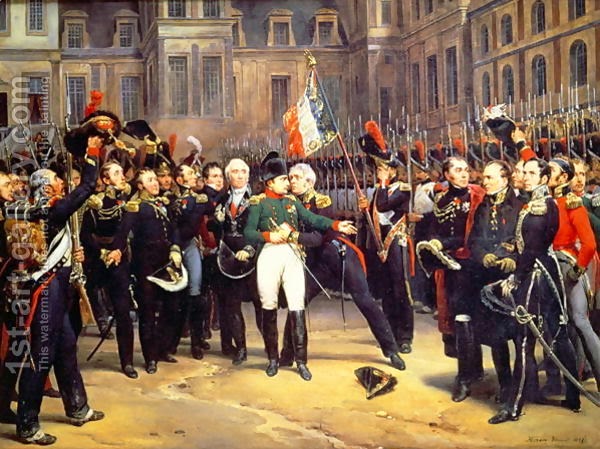In early April, 1814, Napoleon’s career as l’Empereur, came to its first end. Spoiler Alert: it didn’t last for long…

Following the disaster of his failed invasion of Russia in 1812, Napoleon’s brilliance as a general seemed to fail him. After losing thousands of troops in the battles and long trek back to France, his Grand Armée never regained its primacy. Napoleon lost the Battle of Leipzig against the Sixth Coalition (Great Britain, Austria, Russia, Prussia, Sweden, Spain, and Portugal) in October, 1813, the largest and bloodiest battle of the Napoleonic Wars, with over 90,000 casualties.
After this defeat, Napoleon’s forces were doomed. Coalition forces pursued him into France from the east and the British-led armies of the Peninsular War had invaded France from the south. Paris fell to the Coalition in March 1814.

Napoleon had withdrawn to the palace at Fontainebleau where, learning of the French Senate’s act deposing him, he abdicated in favor of his son on April 4, 1814. His second wife, Marie Louise, was to be regent. The Coalition Allies were not amused. They insisted on a complete abdication, with Marie Louise and her son to be sent out of France, as well as Napoleon himself.
On April 11, 1814, he signed the act of abdication declaring he “…renounces, for himself and his heirs, the thrones of France and Italy, and that there is no personal sacrifice, even that of his life, which he is not ready to do in the interests of France.”
After saying farewell to the last of his faithful troops, Napoleon was exiled to the island of Elba off the southern coast of France.
We all know the familiar story of his escape from Elba in February 1815 while the leaders of the Allies were conferring at the Congress of Vienna about how to undo his conquests, his return to France and his attempts to regain full power by retaking Belgium. Unfortunately for his ambitions, the Allies had other ideas. Led by the 1st Duke of Wellington, the Allied Armies defeated the French in the Battle of Waterloo, June 18, 1815. Within a few weeks, Napoleon surrendered to the British (July 15, 1815) and was sent to the remote south Atlantic island of St Helena, where he died six years later.
Napoleon (1769-1821) is one of those historical characters who has become much larger than life since his death. In the nearly 200 years since he was decisively defeated at the Battle of Waterloo and subsequently exiled to St.Helena, his accomplishments have apparently outweighed his destruction of thousands of lives in popular thought. He had taken power in France in 1799, in the aftermath of the Revolution and Reign of Terror. His reign brought many needed reforms, such as ending feudal practices and enforcing religious toleration. He is particularly honored for his adoption of the new system of national law, the Code Napoleon.
After his 1821 death in St Helena, he was buried on the island. In 1840, his remains were returned to France with great pomp, and his elaborate tomb was set in the Dôme des Invalides in Paris, completed in 1860.
However his accomplishments have been honored, Napoleon’s ability to justify incredible national sacrifice in service to his ambition to rule all of Europe is not as admirable. His efforts took more than ten years, cost a countless thousands of lives, and destroyed great swatches of territory. You can have your Napoleon, if you want him — we’ll take the real hero, Arthur Wellesley, the 1st Duke of Wellington!




An excellent sketch of Napoleon's last years and the pictures are wonderful. I confess to admiration of his achievements [the Codes] and admire the determination and charisma that allowed him to rise so high. Hmm, perhaps I should do a blog of my own about him… I went to Fontainebleau and saw many items from his time there. None of this detracts from my admiration for Wellington – two capable generals set against each other.